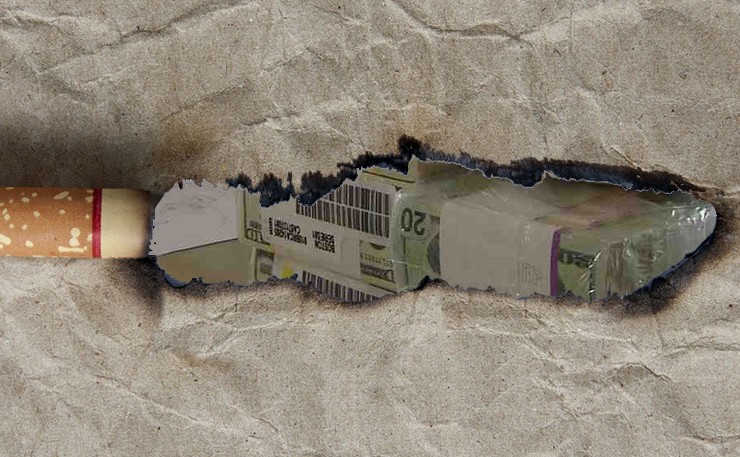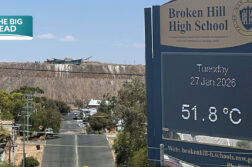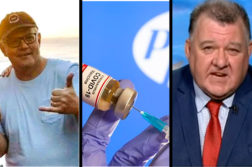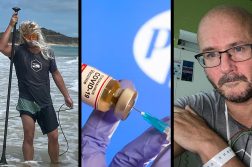EXCLUSIVE: The world’s largest tobacco peddler has been caught moving millions of dollars in cash across international borders. In this special New Matilda investigation, Michael Gillard speaks to an insider with detailed knowledge of the operation, and explosive photographic evidence.
BRITISH American Tobacco paid ex-SAS soldiers and gun-totting rebels to protect the secret movement of millions of dollars in cash to fund its operation in east Africa, a whistle-blower has told New Matilda.
Paul Hopkins, a former special forces soldier employed by BAT from 2001 to 2014, revealed how dressed as a priest with a weapon under his cassock he secretly crossed on foot from Uganda into the war-torn Democratic Republic of Congo (DRC) to deliver US$2m in a ruck sack.
He said he also loaded up to five million dollars onto a light aircraft that was flown “under the radar” to a remote airstrip where Congolese rebels armed with AK-47s escorted the cash to BAT’s jungle base.
“These drops had to be illegal, that amount across an international border without any government being aware of it. It had been going on before I joined,” said Hopkins, who admits making up to five trips, including two on foot.
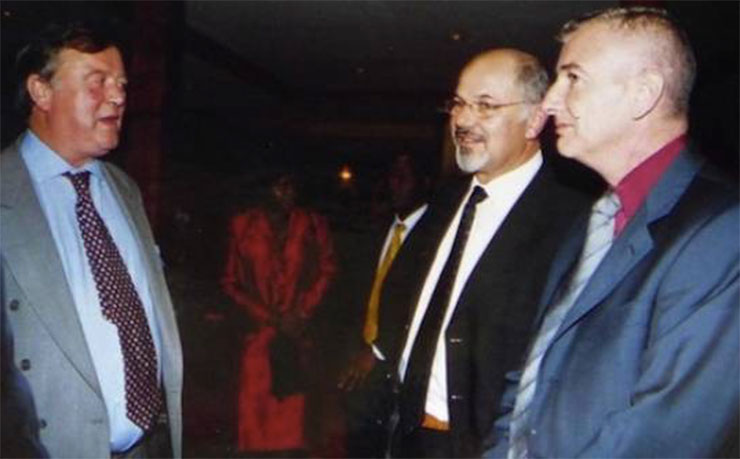
The undeclared movement of large amounts of cash across international borders is an offence in many countries and BAT may also have breached money-laundering laws.
The revelations come as the UK Serious Fraud Office (SFO) yesterday announced a formal corruption investigation into BAT’s African operation based on Hopkins’ other allegations of bribery to undermine anti-smoking laws.
Last week BAT completed a multi-billion dollar “transformational deal” to buy a rival cigarette manufacturer making it one of the world’s biggest tobacco companies.
The secret cash drops will now form part of the SFO probe into whether BAT was involved in systematic bribery and corruption in Africa.
Hopkins has already passed SFO investigators a cache of internal documents describing how he became involved in a plot to bribe politicians and officials from at least five African nations as part of a BAT “dirty tricks campaign” to undermine an international public health treaty on smoking.
BAT admits some bribery took place and has launched an on-going internal inquiry. But the makers of premium brands Dunhill, Rothmans and Lucky Strike claim it was a rogue operation directed by the Kenyan office without the knowledge of its London headquarters.
Hopkins, 53, an expert sniper and former members of the Irish Army’s Ranger Wing, and other former BAT employees in Kenya, dispute this.
They say the bribery and other “black ops” were authorised from London and Hopkins has provided the SFO with tape recordings of conversations to back up his claim.
The whistleblower, who left BAT after a dispute over his redundancy, has now provided New Matilda with a sensational photograph to prove his claim about the cash drops.
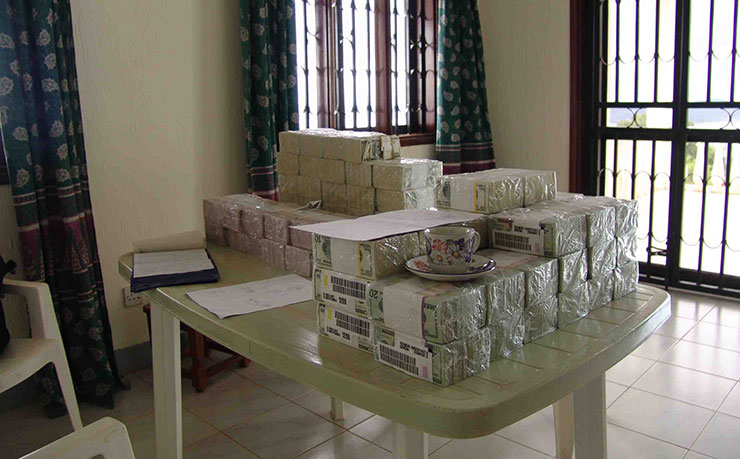
Hopkins said the photograph, published for the first time here, shows “4.4m dollars sitting in a safe house in Kampala” before it was allegedly loaded on to a Cessna plane and flown to the Ugandan border.
From there, Hopkins said he drove with armed rebels to Auzi, the village BAT constructed 70 miles into eastern DRC and where it buys tobacco leaf from local farmers.
“I’d get authorisation to withdraw sometimes US$4m in cash and went off the radar until I came back. No-one in BAT was allowed to know until I came back because there was more risk of someone from BAT leaking it,” he said.
The money was withdrawn in Kampala from a South African bank that had an arrangement with BAT. Hopkins was then flown in a Cessna to Arua, on the north-eastern Ugandan border.
“I would be dropped off at Arua, a no man’s land, and then I would go through the bush. Sometimes I used the disguise of a priest to get across the border. I had an AK and a pistol, something like that. And it would take two and a half days if you are walking it [to Auzi].
“At the time I was doing it there was a man called Alphonse, he was the head of leaf for BAT, and he’d kick the bags under the bed and I would stay in the guest house overnight.”
The cash was not kept in a safe, he was told, because of a concern that if other rebels in the DRC overran the village that was where they would go first.
Hopkins said the cash drops on foot only happened when the road was not passable.
“We maintained the road from Auzi for transporting the leaf. The only time when we went on foot was in the rainy season when the road was washed away. Other than that we’d be met at the border by Alphonse and some Congolese rebels.”
Asked why the cash was not flown direct to Auzi, Hopkins said there were security issues concerning the civil war in DRC, and that the airstrip in the BAT village had been mined.
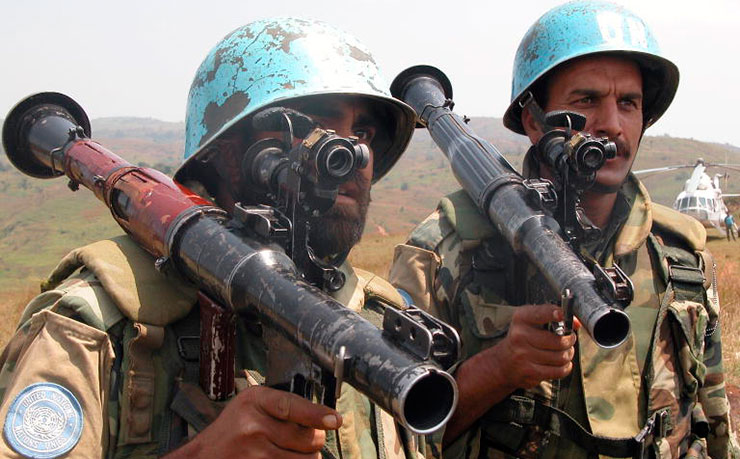
in Che, Ituri province, DRC.
(IMAGE: UN Christophe Boulierac, Flickr)).
“The UN controlled the eastern area of DRC so we would have to file a flight plan and if we went in too low they could shoot us down,” he explained.
Hopkins said he suggested to BAT they could de-mine the airstrip in Auzi by driving cattle through it but the company refused. “BAT were concerned about the cattle which is a bit odd for a company selling cancer to people,” he quipped.
Documents confirm that BAT used a number of private security firms in Africa as “cut outs” to conduct deniable operations.
Hopkins identified the now defunct Defense Systems Limited (DSL) as the security firm he worked with to make the secret cash drops.
He said the movement of money to DRC was going on before he joined BAT in 2001, first as a DSL contractor and then as a full-time BAT security manager with responsibility for east Africa.
DSL was set up by leading senior officers from the British SAS and exclusively employed former special forces soldiers from across the world, including Australia, to protect multinationals, particularly in the oil industry.
“We’ve being doing these drops for years. Either the DSL group, ex SAS guys, would do it or I’d do it. DSL were doing it before me,” said Hopkins.
BAT contracted DSL to provide guards for its DRC operation in the capital, Kinshasa, and for the whole of Uganda, said Hopkins. “It was a big contract.”
However, an escalation in the DRC civil war meant the operation there had to be run from Uganda and Kenya.
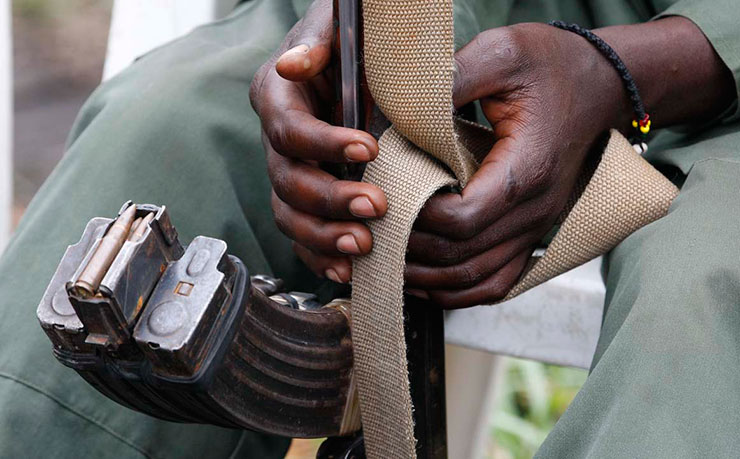
Hopkins said DSL’s Uganda office provided him with a pistol on a temporary licence for the cash drops he did on foot. And if he entered by plane, Hopkins said he rented an AK-47 from the Congolese rebels in the truck waiting at the DRC border.
Up to five rebels guarded the BAT village at Auzi, said Hopkins and they were paid in cash to protect the village from other armed groups and for riding shotgun on the cash drops.
Hopkins believes the rebels paid by BAT were loyal to the Kabila family. Joseph Kabila, the current president, is said to have amassed a huge personal fortune after sixteen years in power, according to research by New York University based on official financial documents.
The civil war since the 1990s was fuelled by the battle for control of the country’s incredible mineral resources, such as diamonds and coltan, an essential material for making mobile phones.
Atrocities by all sides have been well documented and BAT’s financial involvement with Congolese rebels raises questions about its human rights policies at the time.
Hopkins said some of the cash taken to Auzi was used to pay farmers growing tobacco leaf. The village was built in the 1950s.
“We had 36,000 farmers in eastern Congo contracted to grow leaf for us and they would bring it to centres and the BAT agronomist would grade it. The leaf is then transported by trucks to Uganda and Kenya.”
BAT paid for the leaf in dollars, he said, because of the hyperinflation of Congolese francs. Part payment for leaf was also made in goods such as bicycles and wind up radios from the BAT store.
Hopkins said the last drop he did was in 2006 when he moved from BAT’s Security department to its anti-smuggling unit (AIT). He understood that BAT later contracted a company inside the DRC to deliver cash to Auzi and then reimbursed them through normal banking channels.
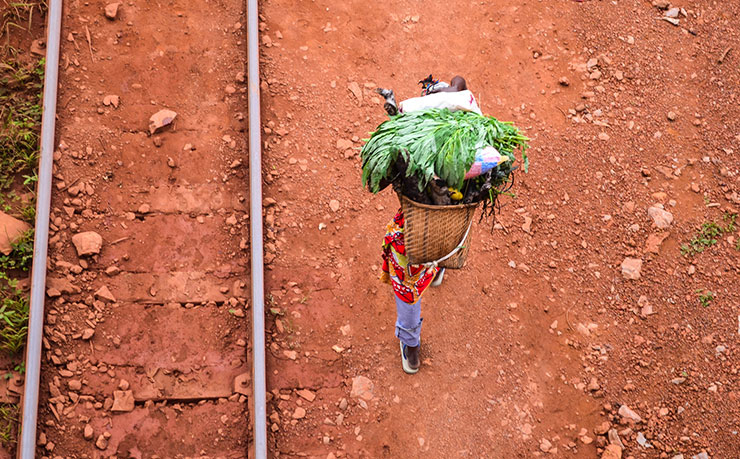
It was while Hopkins headed the AIT unit in Kenya that he was asked to get involved in bribing African politicians and officials to undermine the World Health Organisation’s 2005 Framework Convention on Tobacco Control (FCTC).
The FCTC seeks to control the £500 billion tobacco industry. But BAT, who produces 660 billion cigarettes a year, has called the legally binding global agreement an “unprecedented challenge” to growth in core markets such as Africa, where it is the dominant force.
Hopkins revealed how at the behest of BAT’s East Africa corporate and regulatory affairs (CORA) department, between April and July 2012 he arranged the bribery of officials in Rwanda, Burundi and the Comoros Islands to water down implementation of the FCTC.
Internal documents show that Hopkins used a Nairobi-based company as a conduit for making six cash payments totalling £20,000 to the government officials.
Details of BAT’s attempt to covertly undermine the treaty only emerged when Hopkins brought an unsuccessful claim for unfair dismissal in January 2015.
The tobacco giant admitted in its legal response to the claim that the six CORA payments were ‘unlawful bribes’ but continues to maintain it was an isolated instruction from Julie Odellowino, a Kenyan manager and lawyer, who subsequently left the company.
Odellowino, however, appears unwilling to carry the can. “I have nothing to hide and I have a clear conscience…. A better picture of the truth if not the whole picture” will emerge from BAT’s internal inquiry, she said in response to a written request for an interview.
Hopkins has told the SFO that London was aware of the dirty tricks campaign and passed thousands of documents to investigators.
Further allegations of bribery and an illegal spying operation on Carnilinx, a rival company in South Africa, also suggest that executives at Globe House, BAT’s London headquarters, were aware.
The SFO has been debriefing Hopkins for over one year.
The whistleblower is now writing a book about his exploits as ‘the Devil’s fixer’ who for years across Africa also cleaned up after randy BAT executives involved with drugs and prostitutes.
BAT, which completed its US$49.4bn bid for the remaining shares of Reynolds American Inc on July 25, declined to comment on Hopkins’ specific allegations while the SFO and internal investigations are on-going.
However, in a statement, the company said: “We will not tolerate improper conduct in our business anywhere in the world and take any allegations of misconduct extremely seriously. We are investigating, through external legal advisors, allegations of misconduct and are liaising with the Serious Fraud Office and other relevant authorities.”
* New Matilda is an independent investigative media outlet. We survive on contributions from readers. You can help support this kind of journalism by subscribing for as little as $6 per month. Click here to support us.
Donate To New Matilda
New Matilda is a small, independent media outlet. We survive through reader contributions, and never losing a lawsuit. If you got something from this article, giving something back helps us to continue speaking truth to power. Every little bit counts.

